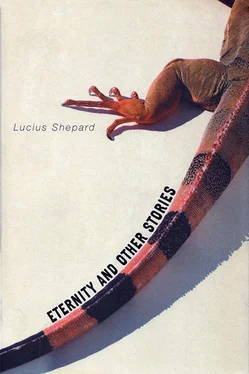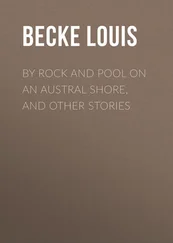Люциус Шепард - Eternity and Other Stories
Здесь есть возможность читать онлайн «Люциус Шепард - Eternity and Other Stories» весь текст электронной книги совершенно бесплатно (целиком полную версию без сокращений). В некоторых случаях можно слушать аудио, скачать через торрент в формате fb2 и присутствует краткое содержание. Город: New York, Год выпуска: 2005, ISBN: 2005, Издательство: Thunder's Mouth Press, Жанр: Фантастика и фэнтези, prose_magic, на английском языке. Описание произведения, (предисловие) а так же отзывы посетителей доступны на портале библиотеки ЛибКат.
- Название:Eternity and Other Stories
- Автор:
- Издательство:Thunder's Mouth Press
- Жанр:
- Год:2005
- Город:New York
- ISBN:978-1-560-25662-5
- Рейтинг книги:5 / 5. Голосов: 1
-
Избранное:Добавить в избранное
- Отзывы:
-
Ваша оценка:
- 100
- 1
- 2
- 3
- 4
- 5
Eternity and Other Stories: краткое содержание, описание и аннотация
Предлагаем к чтению аннотацию, описание, краткое содержание или предисловие (зависит от того, что написал сам автор книги «Eternity and Other Stories»). Если вы не нашли необходимую информацию о книге — напишите в комментариях, мы постараемся отыскать её.
“Lucius Shepard’s stories a jungles — densely alive, sometimes mysterious, often gorgeous, and always dangerous.” — Katerine Dunn, author of Geek Love
Eternity and Other Stories — читать онлайн бесплатно полную книгу (весь текст) целиком
Ниже представлен текст книги, разбитый по страницам. Система сохранения места последней прочитанной страницы, позволяет с удобством читать онлайн бесплатно книгу «Eternity and Other Stories», без необходимости каждый раз заново искать на чём Вы остановились. Поставьте закладку, и сможете в любой момент перейти на страницу, на которой закончили чтение.
Интервал:
Закладка:
A key lay on the scaffolding beside the note—it fit the oak door. I locked the door, pocketed the key and went about my business, understanding this show of trust to signify the board’s recognition that I had accepted my lot and that by taking up their charge I might earn a further degree of trust and so learn something to my benefit. To succeed in this I would have to do something that would enlist their delusion, and I immediately set about working on a design that would illustrate the essence of the delusion, The Heart of the Law. Though I began with cynical intent, as the weeks went by and my cell walls were covered with sketches, I grew obsessed with the project. I wanted the mural to be beautiful and strong to satisfy the artistic portion of my nature, my ego, and not simply to satisfy the board—in truth, I presumed they would approve of anything I did that hewed to their evangel. The dome and walls of the anteroom, the graceful volume of space they described, inspired me to think analytically about painting, something I had not done before, and I challenged myself to transcend the limits of my vision, to conceive a design that was somehow larger than my soul. I came to dwell more and more on the motive theory of Diamond Bar, that the criminal was the fundamental citizen, the archetype in whose service the whole of society had been created, and in the process I came obliquely to embrace the idea, proving, I suppose, the thesis that high art is the creation of truth from the raw materials of a lie, and the artist who wishes to be adjudged “great” must ultimately, through the use of passion and its obsessive tools, believe the lie he is intent upon illuminating. To augment my analytic capacities, I read books that might shed light on the subject—works of philosophy for the most part—and was astonished to discover in the writings of Michel Foucault a theory mirroring the less articulate theory espoused by the prison population. I wondered if it might be true, if delusion were being employed in the interests of truth, and, this being the case, whether the secret masters of Diamond Bar were contemplating a general good and the experiment of which we were a part was one that sought to evolve a generation in harmony with the grand design underlying all human culture. The books were difficult for me, but I schooled myself to understand them and became adept at knotting logic into shapes that revealed new facets of possibility—new to me, at any rate. This caused me to lose myself in abstraction and consequently diminished the urgency of my intention to escape. Like everyone who lived at Diamond Bar, I seemed to have a talent in that regard.
The design I settled upon owed more to Diego Rivera and Soviet poster art than to the muralists of the Renaissance. The walls would be thronged with figures, all reacting toward the center of the design, which was to occupy the dome and which I had not yet been able to conceptualize—I felt the image would naturally occur as a byproduct of my labors. It took three months of twelve-hour days to lay out the sketch on the walls, and I estimated that, if done properly, the painting would take a year to complete. Chances were I would be gone from Diamond Bar before then, and realizing this, when I began to paint, ensorcelled by my vision, driven by the idea of finishing in a shorter time, I worked fifteen and sixteen hours a day. Dangling in harness from the scaffolding, crouched over, forced into unnatural positions, I gained an appreciation for the physical afflictions that Michelangelo endured while painting the Sistine Chapel. Each night after work I tried to shake off the aches and pains by walking through the sub-basements of the prison, and it was during one of these walks that I encountered the plumes.
In prison, sex is an all-consuming preoccupation, a topic endlessly discussed, and from my earliest days at Diamond Bar the plumes had been recommended as a palatable alternative to self-gratification. The new wing, it was said, would house both women and men, thus ending the single unnatural constraint of prison life, and many held that the plumes would eventually become those women, evolving—as were we all—into their ideal form. Even now, Causey said, the plumes were superior to the sex available in other prisons. “It’s not like fucking a guy,” he said. “It feels, y’know, okay.”
“Is it like fucking a woman?” I asked.
He hesitated and said, “Kinda.”
“‘Kinda’ doesn’t do it for me.”
“Only reason it’s different is because you’re thinking about it not being a woman.”
“Yeah, well. I’ll pass. I don’t want to think when I’m fucking.”
Causey continued urging me to give the plumes a try, because—I believed—he felt that if I surrendered to temptation, I would become a complicitor in perversion, and this would somehow lessen the guilt attaching to his sexual assault on me. That he felt guilty about what had transpired between us was not in question. As our relationship progressed, he came to speak openly about the event and sought to engage me in a dialogue concerning it. Therapy, I supposed. Part of his process of self-examination. At the time, I rejected his suggestions that I visit the plumes out of hand, but they may have had some effect on me, for in retrospect I see that my initial encounter with them, though it seemed accidental, was likely an accident I contrived. I was, you see, in a heightened state of sexuality. Immersed in my work, essentially in love with it, while painting I would often become aroused not by any particular stimulus—there were no visual or tactile cues—but by the concentrated effort, itself a form of desire maintained at peak intensity for hours on end. And so on the night I strayed into the section of the prison occupied by the plumes, I was, though tired, mentally and sexually alert. I was tempting myself, testing my limits, my standards, hoping they would fail me.
Three levels down from the main walls were dozens of rooms—bedchambers, a communal kitchen, common rooms, and so forth—an area accessed by a double door painted white and bearing a carved emblem that appeared to represent a sheaf of plumes, this the source of the name given to those who dwelled within. Much of the space had the sterile decor of a franchise hotel: carpeted corridors with benches set into walls whose patterned discolorations brought to mind art nouveau flourishes. The common rooms were furnished with sofas and easy chairs and filled with soft music whose melodies were as unmemorable as an absent caress. No barred gates, just wooden doors. The lighting was dim, every fixture limned by a faint halation, giving the impression that the air was permeated by a fine mist. I felt giddy on entering the place, as if I had stood up too quickly. Nerves, I assumed, because I felt giddier yet when I caught sight of my first plume, a slim blond attired in a short gray dress with spaghetti straps. She had none of the telltale signs of a transvestite or a transsexual. Her hands and feet were small, her nose and mouth delicately shaped, her figure not at all angular. After she vanished around a corner, I remembered she was a man, and that recognition bred abhorrence and self-loathing in me. I turned, intending to leave, and bumped into another plume who had been about to walk past me from behind. A willowy brunette with enormous dark eyes, dressed in the same fashion as the blond, her mouth thinned in exasperation. Her expression softened as she stared at me. I suppose I gaped at her. The memory of how I behaved is impaired by the ardor with which I was studying her, stunned by the air of sweet intelligence generated when she smiled. Her face was almost unmarked by time—I imagined her to be in her late twenties—and reminded me of the faces of madonnas in Russian ikons: long and pale and solemn, wide at the cheekbones, with an exaggerated arch to the eyebrows and heavy-lidded eyes. Her hair fell straight and shining onto her back. There was nothing sluttish or coarse about her; on the contrary, she might have been a graduate student out for an evening on the town, a young wife preparing to meet her husband’s employer, an ordinary beauty in her prime. I tried to picture her as a man but did not succeed in this, claimed instead by the moment.
Читать дальшеИнтервал:
Закладка:
Похожие книги на «Eternity and Other Stories»
Представляем Вашему вниманию похожие книги на «Eternity and Other Stories» списком для выбора. Мы отобрали схожую по названию и смыслу литературу в надежде предоставить читателям больше вариантов отыскать новые, интересные, ещё непрочитанные произведения.
Обсуждение, отзывы о книге «Eternity and Other Stories» и просто собственные мнения читателей. Оставьте ваши комментарии, напишите, что Вы думаете о произведении, его смысле или главных героях. Укажите что конкретно понравилось, а что нет, и почему Вы так считаете.












